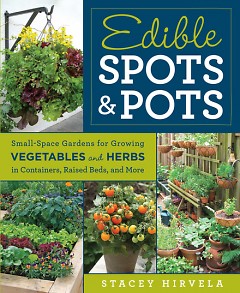
Hirvela's book hits shelves March 25 /Courtesy of Stacey Hirvela

Hirvela's book hits shelves March 25 /Courtesy of Stacey Hirvela
On Saturday, Flowerland in Kentwood will host a free lecture and discussion with horticulturist Stacey Hirvela entitled "Edible Spots and Pots: Small-Space Gardens for Growing Vegetables and Herbs in Containers, Raised Beds and More" based on her upcoming book of the same title.
"It is the perfect time to make a plan to grow your own food. It’s important to realize that it’s okay to start small! A lot of people feel like they have to do it all the first year and you don’t," says Hirvela.
"Educating and inspiring people are the two main goals of everything I do in horticulture, and I try to pack in a lot of useful information when I do talks," says Hirvela.
As a graduate of the New York Botanical Garden School of Professional Horticulture, Hirvela has gardened New York City rooftops, wrote and edited gardening content for Martha Stewart Living, and hosted her own Sirius satellite radio program entitled "Homegrown."
"I know that there is often a mix of gardening experience and skill levels," says Hirvela. "I aim to appeal to both groups by telling people not just what to do but the why – the reason behind it – so they can apply it to all areas of gardening, not necessarily just growing edibles."
The Flowerland event aims to shed light on gardening practices within small spaces and limited resources, problems often faced by those living in urban settings. Urban soil also faces the possibility of being contaminated by exhaust and the prevalence lead paints.
"Urban soils are [also] generally very compacted, making digging difficult. Growing in raised beds or containers as the book describes resolves all of these issues," says Hirvela. "you control what soil gets used in them, you can place containers in areas where you normally wouldn’t be able to garden, like driveways, porches and walkways, and you can just grow on top of whatever problem area prevents you from growing in the ground."
Creating raised bed gardens from the ground up may be perceived as a costly endeavour but Hirvela says her methods can be adapted for any budget.
"These issues are just as likely to challenge high income folks as they are low income," says Hirvela. "For low income gardeners, or simply frugal gardeners, of which there are many, starting to grow in raised beds and containers takes a bit of resourcefulness, but it is absolutely possible and can be even more rewarding."
"You can talk to local restaurants, especially pizza places, and ask if they will give you the 5 gallon buckets that many of their ingredients come in," says Hirvela. "These are food safe and can be drilled for drainage and used to grow larger crops like tomatoes." Hirvela notes that it is important to make sure these buckets have not held non-edible materials such as drywall compound or detergent. These substances can contaminate edible crops though they may be used for ornamental plants.
"Vegetable gardens have a huge nostalgia factor for many people," says Hirvela. "Even young people remember a grandparent’s garden, and want to connect to their past. Honoring family and culture in a vegetable garden sends a pretty potent message to others, and again, it breaks down a wall that maybe keeps neighbors from establishing regular contact with one another."
Hirvela notes growing markets in heirloom seeds to preserve unique varieties from cultures all over the world.
"Immigrants can now easily grow many of the same varieties of food that they grew in their home country – even something really, really esoteric," says Hirvela. "As cooking increasingly becomes a means of self-expression, growing your own food and using it is an ideal way to live creatively and show the people around you that you love them with healthy, homegrown food."
The Rapidian, a program of the 501(c)3 nonprofit Community Media Center, relies on the community’s support to help cover the cost of training reporters and publishing content.
We need your help.
If each of our readers and content creators who values this community platform help support its creation and maintenance, The Rapidian can continue to educate and facilitate a conversation around issues for years to come.
Please support The Rapidian and make a contribution today.